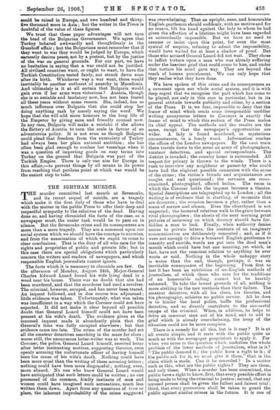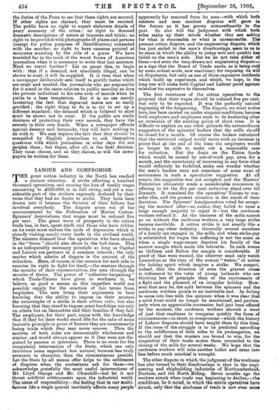. THE IGHTHAM MURDER.
The facts which it is necessary to chronicle are few. On the afternoon of Monday, August 24th, Major-General Charles Edward Luard found his wife lying dead in a wood near his house. There was no doubt that she had been murdered, and that the murderer had used a revolver. The criminal, however, escaped, and has never been traced. An inquest followed, and in due course was adjourned; little evidence was taken. Unfortunately, what was taken was insufficient in a way which the Coroner could not have expected.. It did not make it clear beyond all possible doubt that General Luard himself could not have been present at his wife's death. The evidence given at the resumed inquest made it abundantly plain that the General's time was fully occupied elsewhere; but that evidence came too late. The crime of the murder had set all the amateur detectives searching in the maze for clues ; worse still, the anonymous letter-writer was at work. The Coroner, the police, anonymous Luard himself, received letter after letter insinuating motives, suggesting theories, even openly accusing the unfortunate officer of having himself been the cause of his wife's death. Nothing could have been more cruel than the writing of these accusing letters ; nothing could have been more disgraceful ; nothing, even; more absurd. No one who knew General Luard would have anticipated that such letters could be written ; no one possessed of the common, kindly instincts of men and women could have imagined such accusations, much less written them down. Apart from any questions of time or place, the inherent improbability of the crime suggested was overwhelming. That an upright, sane,.and honourable English gentleman should suddenly, with ne motive-and for no reason, lift his hand- against the lady to, whom he had given the affection of a lifetime might have been regarded. as antecedently impossible. But we have no need to assume or insist upon this point, for even the most cynical of sceptics, refusing to admit the impossibility, would have waited for at least a shadow of proof. But those who accused General Luard did not wait. They chose to inflict torture upon a man who was already suffering under the heaviest grief that could come to him, and under that torture his mind gave way. They are beyond the reach of human punishment. We can only hope that they realise what they have done.
We have spoken of this crime and its consequences as a. comment upon our whole social system, and it is with deep regret that we recognise the part which has come to be played, not only in this case in particular, but in its general attitude towards publicity and crime, by a section of the Press. It is, we fear, impossible to deny that the frame of mind which sends some irresponsible meddler writing anonymous letters to Coroners is exactly the frame of mind to which this section of the Press makes its chief appeal. The methods and the results are the same, except that the newspaper's opportunities are wider. A lady is found murdered, in mysterious circumstances, in a lonely wood. Information roaches the offices of the London newspapers. By the next train there travels down to the scene an army of photographers, amateur detectives, and special correspondents. The district is invaded ; the country home is surrounded. All respect for privacy is thrown to the winds. There is a rush to interview any neighbour or passer-by who could have had the slightest possible connexion with the acme of the crime ; the victim's friends and acquaintances are sought out and questioned ; the servants are cross- examined, photographed, offered bribes. The room in which the Coroner holds the inquest becomes a theatre.
Special descriptions are telegraphed up to London ; all the writing is of evidence that is startling, of moments that are dramatic ; the occasion becomes a play, rather than a scene of sorrow and silence. Even the churchyard is not respected; the bereaved relatives walk to the grave between rival photographers ; the sheets of the next morning print pictures of mourning on which decency should have for- bidden a man to look. Finally, when authority denies access to private letters, the contents of an imaginary communication are deliberately concocted ; and, as if it • were not enough to drive a bereaved English gentleman to insanity and suicide, words are put into the dead man's mouth which could have but one meaning, yet which, in fact, have not the remotest relation to anything he ever wrote or said. Nothing in the whole unhappy story is worse than the end, though, perhaps, it was an inevitable consequence of the beginning. From first to last it has been an exhibition of uu-English methods of journalism, of which those who care for the traditions of an honourable calling cannot but be heartily ashamed. To take the lowest grounds of all, nothing is more striking in the new methods than their failure. The amateur detective, with all his clues, his theories, and his photography. achieves no public service. All he does is to hinder the local police, baffie the professional detective, and so directly contribute to the sucressful escape of the criminal. When, in addition, he helps to drive an innocent man out of his mind, and to add to grief which is already overwhelming, the irony of the situation could not be more complete.
There is a remedy for all this, but is it easy ? It is at all events simple, and it rests with the public quite as much as with the newspaper proprietors to apply it. For when you come to the question which, underlies the whole problem of the lower methods of journalism., what is it? "The public demand it ; the public have a right to it ; if
the public ask for it, we must give it them," that is the claim which is made. Can it be conceded? In a matter
such as this, what are the public rights ? They are these, and only these. When a murder has been committed, the public have a right to know, first, that every possible effort is being made to bring the criminal to justice; second, that any accused person shall be given the fullest and fairest trial ; third, that every precaution shall be taken to guard the public against similar crimes in the future. It is one of
the duties of the Press to see that these rights are secured. If ether rights are claimed, they must be resisted. The public have no right to expect elaborate details of every accessory of the crime ; no right to demand dramatic descriptions of scenes at inquests and trials; no right to be provided with photographs of places and persons (except for police purposes of identification) connected with the murder; no right to have cameras pointed at mourners standing by the side of a grave. We have travelled far in the track of the worst forms of American journalism when it is necessary to write that last sentence. Weed, we travel further ? Let us grant this, to begin with : that if a demand, not absolutely illegal, can be shown to exist, it will be supplied. It is true that when a newspaper deliberately sets itself to gratify tastes which am cruel and morbid, the journalists who are responsible for it stand in the same relation to public morality as does the private individual to his own eode of morals when he yields to a base temptation. But it is no use merely lamenting the fact that depraved tastes are so easily gratified ; the right thing to do is to try to set up a different standard; the demand which is believed to exist must be shown not to exist. If the public are really desirous of protecting their own morals, they have the remedy in their own hands. When a newspaper offends against decency and humanity. they will have nothing to do with it. We may deplore the fact that they should be compelled by English journalism to ask themselves questions with which journalism in other days did not Trplex them ; but theirs, after all, is the final decision. hey must choose, and as they choose, so will the news- papers be written for them.











































 Previous page
Previous page